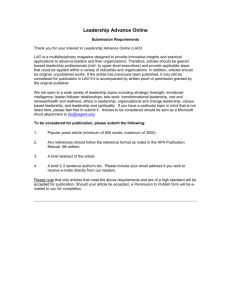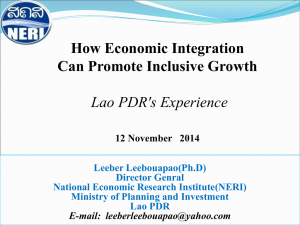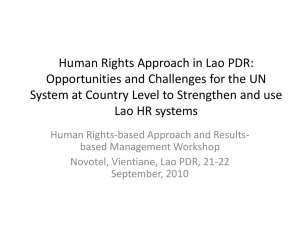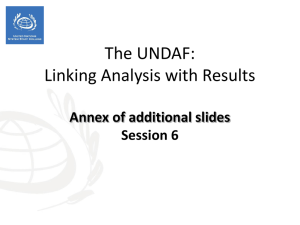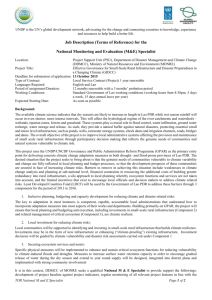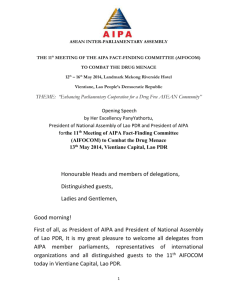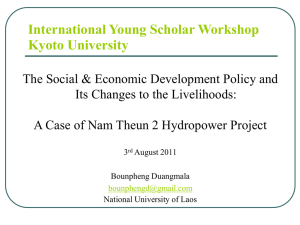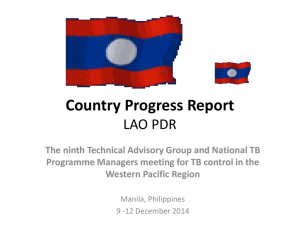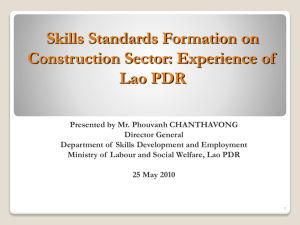ENG - The National Round Table Process
advertisement
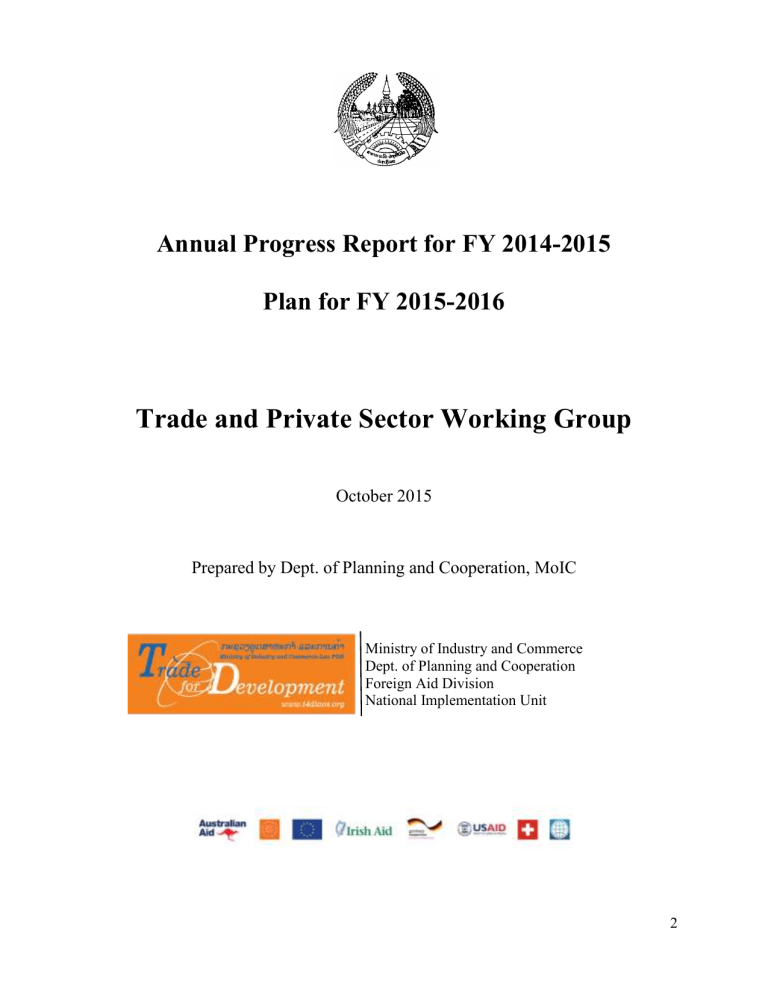
Annual Progress Report for FY 2014-2015 Plan for FY 2015-2016 Trade and Private Sector Working Group October 2015 Prepared by Dept. of Planning and Cooperation, MoIC Ministry of Industry and Commerce Dept. of Planning and Cooperation Foreign Aid Division National Implementation Unit 2 Contents 1. Overview of the Trade and Private Sector Development Roadmap ........................ 4 2. The Trade and PSD Roadmap Implementation Progress in 2014-2015 .................. 5 2.1 Establishing conducive trade and investment environment ....................................... 5 2.2 Improving competitiveness, quality and value of agribusiness, manufacturing and service sectors ............................................................................................................... 10 2.3 Improving aid for trade governance framework for mainstreaming trade and private sector development....................................................................................................... 13 3. Key challenges ........................................................................................................... 15 4. Priorities for FY 2015-2016......................................................................................... 17 4.1 Trade and Investment Environment........................................................................... 17 4.2 Enterprise and sector competitiveness ....................................................................... 22 4.3 Trade mainstreaming and AfT Governance ............................................................... 23 3 1. Overview of the Trade and Private Sector Development Roadmap Implementation of the New Economic Mechanism (NEM) has enabled the private sector, both domestic and foreign, and including small and medium-sized enterprises (SMEs), to play an ever-increasing role in the economy. The private sector is expected to account for a much larger part of the economy as the Government attempts to achieve its goal of graduating from LDC status by 2020. The Government links the achievement of Vision 2020 to attaining an annual GDP growth rate of 8 percent from the present to 2020, on the basis of total investments made each year of around 30 per cent of GDP. More than 50 per cent of the investment is expected to be mobilized from the domestic and foreign private sector.1 Guided by the NSEDP and research for the DTIS, the key concrete strategy and measures for maintaining a high growth rate in the manufacturing industry and service and commerce sectors include: 1) Establishing conducive trade and investment environment through: a. Promoting trade Integration (post-WTO accession, and towards AEC) b. Improving business environment c. Improving trade facilitation d. Building quality infrastructure 2) Improving competitiveness, quality and value of agribusiness, manufacturing and service sectors through: a. Implementing SME firm level quality and productivity support measures b. Supporting Public-Private Dialogue and sector specific support measures i. Agribusiness ii. Tourism iii. Textile handicraft iv. Garments v. Wood processing vi. Promoting offshoot industries from the mining and hydropower industries 3) Improving aid for trade governance framework for mainstreaming trade and private sector development through: a. Mainstreaming poverty, gender and the environment b. Institutional capacity development c. Sector Working Group Development and mainstreaming trade in National Development Planning d. Trade and Aid for trade governance framework and implementation 1 National Socio-Economic Development Plan 7. 4 2. The Trade and PSD Roadmap Implementation Progress in 20142015 Overall implementation of the Trade and PSD Roadmap in 2014/15 fiscal year has been significantly accelerated. Activities are moving ahead across all three pillars of the project and delivery of key outputs is broadly on track. Early results provide encouragement that all the projects are making important contributions to achieving strategic outcomes of the Roadmap. Key achievements of the implementation progress of all projects under the Trade for Development (T4D) structure are described below by pillar of the Roadmap. 2.1 Establishing conducive trade and investment environment The sector Roadmap aims to establish conducive trade and investment through promoting economic integration by focusing on effective implementation of goods and services commitments at both the WTO and ASEAN levels, including a strong emphasis on private sector engagement. Major achievements during 2014/15 fiscal year included the followings: 1) Fulfilling commitments under AEC and WTO membership Completion of the Horizontal Regulatory Assessment for the Service Sectors. The assessment identified laws, regulation and administrative practices that are limiting the potential of the services sector in Lao PDR. In particular, the regulatory assessment included the following elements: i) a mapping of laws and regulations relevant to trade in services; ii) their assessment in light of Laos’ WTO and ASEAN commitments, and iii) the identification of areas where laws and regulations need to be adopted or amended in order to fully reap the benefits of services reforms. Completion of the Regulatory and Institutional Assessment of the Telecommunications Sector. The assessment concluded that the two main priorities for compliance with the WTO Telecom Reference Paper are the i) effective establishment of a sector regulator independent from the policy-making role, and ii) the implementation of a licensing framework to allow the authorization of telecommunications operators. The project also provided support to MoPT in the drafting of regulatory instruments, in particular, on the framework for competition, interconnection, licensing regime and spectrum management. Completion of the needs assessment of the ASEAN MRAs has almost been completed. The assessment examines what Lao PDR needs to do in order to participate fully in the ASEAN Mutual Recognition Agreements (MRAs) for accountants, engineers, architects, surveyors, medical practitioners, dental practitioners and nursing services. Among others, the assessment report provides an analysis of the gaps between the MRA requirements and existing Lao implementation, outlines the issues and challenges that face the various stakeholders responsible for the MRAs as they complete the implementation process, sets out summary recommendations as to how Lao PDR can maximize the benefits from its participation in the MRAs and outlines the actions that flow from these recommendations, including road maps for each MRA sector, and indicates further technical assistance needs. 5 Services Trade and Investment Portal (STIP). Good progress on the collection and classification of the regulation on services is being made. Strengthening trade policy coordination mechanism. Good progress has been made to improve the national trade policy coordination body. The revised Government Decree on the National Steering Committee for Economic Integration (NSCEI) was approved and The NSCEI will be the main body responsible for trade policy coordination in the multilateral and regional trading system, and FTPD will act as the Trade Policy Secretariat, in charge of ensuring coordination, work programing, and regulatory conformity with international trade obligations in all goods and services areas. Significant progress on the drafting of trade remedies legislation has been made. The draft Law on is now rescheduled for submitting to the National Assembly for approval in June 2016. In respect to the draft Law on Anti-Dumpling and the draft Law on Subsidies, it has been decided to combine the two draft Laws into one Draft Law on Anti-Dumpling and Subsidies. According to the indicative work program of FTPD, the newly combined draft Law is expected to kick in for consultation and following steps of the Law on Making Legislations in July 2016. The draft Law is expected to be submitted for approval by the National Assembly in June 2017. SPS legal framework. There is good progress on the revisions of the laws on Plant Protection and Livestock and Veterinary Matters and work on 5 pieces of ministeriallevel legislation is close to completion. Concept notes and drafts have been prepared for the other areas and four policy notes on cross cutting issues, needed as input for legislation and planning of effective implementation, have been prepared for consideration at technical and senior management levels. WTO negotiations. o Supported Lao PDR in DDA negotiations and preparation for participation in the Ministerial meeting in Nairobi; o Performed analysis of benefits and implications for Lao PDR of extended services preferences for LDCs by individual Member countries, and legal analysis of compliance of trade barriers on imports of maize to Thailand with international trade rules; o Carried out trade negotiation capacity building activities to address outstanding negotiation issues under WTO framework. Intellectual Property Rights (IPR) o Supported organization of the IP Fair and commenced technical assistance to developing implementing regulations for the IPR Law – on unfair competition and plant variety; o Enhanced technical capacity coordination to fully implement the IPR border protection measures. o Developed detailed draft guidelines on IPR adjudication for the SPC; o Supported MOST/DIP in the development of implementing regulations on plant variety protection. 6 Trading Rights. o Produced an issue brief outlining how Lao PDR is in compliance with their WTO commitments on trading rights; o Supported FTPD for a consultation workshop with government stakeholders on developing trading rights ministerial guidelines; Assisted with Development of a Law on Safeguards. Assisted MOIC to develop a draft Safeguards Law and carry out the regulatory impact assessment for the Safeguards Law Assisted with Electronic Transactions Law. Drafted implementing regulations on digital secure service providers with MOST/DIT. Enhanced Commercial Dispute Settlement Processes, including supporting LNCCI with development of arbitration guidelines. Completed Business Perceptions Survey, which identified opportunities and challenges to taking advantage of trade agreements and exporting. Commenced development of training courses on trade agreements and trade negotiations Carried out baseline Assessment on the steering, coordination, communication and monitoring of the ASEAN economic integration process, and stocktaking on Lao AECcommitments and their implementation Laos Chairmanship of the Coordinating Committee on the implementation of the ATIGA (CCA) o Support to the participation of Lao delegations in CCA meetings as well as selected other ASEAN meetings as well as Lao Chairmanship of the Coordinating Committee on the implementation of the ATIGA (CCA) o Training Course on Trade in Goods Negotiation Skills o Establishment of focal points in line ministries to coordinate CCS-related matters o Translation of AEC-related trade in services documents into Lao language o Elaboration of Reader in AEC-related Trade in Services o Support in preparing, conducting and moderating consultation meetings with line ministries prior to CCS meetings o Support to the participation of Lao technical staff in CCS meetings and other AEC-related trade in services meetings o Trade in Services Negotiation Skills Training Course “Preparing for ASEAN Negotiations” Carried out baseline assessment on AEC awareness, elaborated awareness raising and information material about the AEC, organized information dissemination events on the AEC. 7 2) Trade facilitation Conducting regular meetings of the TF Secretariat to review the implementation progress of the trade facilitation action plan, and discuss measures to improve inter-ministerial coordination and encourage stronger private sector’s participation in regular public private dialogue process; Review the implementation of the National Trade Facilitation Strategy. Completion of technical assistance needs assessment for the implementation of the Trade Facilitation Agreement. Following technical review and extensive consultations, the WTO Trade Facilitation Agreement was ratified by the Laos National Assembly. The instrument of acceptance of the TFA to WTO was submitted on 29 September and Laos became the second LDC and the 18th WTO member to ratify the Trade Facilitation Agreement. Good progress is being made on implementing capacity building program for trade related agencies. o The training needs assessment with a series of relevant recommendations for the content and scope of the program was completed in November 2014; o Completed the first two trainings of trainers in February 20152; o Commenced delivery of the first two executive training programs in July 20153. The ongoing operation of the Lao Trade Portal has been up-to-date and the similar initiative has been replicated in several developing countries including Lesotho, Bangladesh, Myanmar, Cambodia, Nepal, Malawi and Botswana. The Lao Trade Portal fully complies with the ATIGA’s National and ASEAN Trade Repository Requirements. The portal is live, up-to-date, stable and relevant. The trading community continues to have positive feedbacks on the LTP. As of end March 2015, home page has recorded 42.5 percent of a total cumulative 211,007 hits since its launch in June 2012. Content searches has also recorded increasing hits for legislation (17.2 percent), commodity search (14.4 percent) and import and export manual (10.2 percent) since the launch of the LTP. Between January–March 2015, there were 28 queries in the feedback facilities regarding import, export and transit information and procedures in the LTP. DIMEX responded to these inquiries almost instantly. These statistics have demonstrated that the LTP remains relevant and useful to the public including trading community. Commenced the process to automate issuance of certificate of origin under the Lao Trade Portal using funding from the DTIS Challenge Facility. 2 Train the trainer program has five modules including techniques and skills for orientation, adult learning, lesson presentation and training evaluation. 3 The executive training program covers full ranges of modular topics such as trade facilitation, human resource management, ICT management, risk management, managing regulatory compliance, industry consultations and cooperation, leadership, planning in trade facilitation program, project management, policy practice and process redesign and organizational change. 8 A number of capacity building workshops/seminars/trainings for representatives from trade related agencies, private sector at both central and provincial level have been conducted. During the reporting period, all line ministries, with the exception of the Customs Department, examined the information and authorized its publication in the LTP. In total about 230 NTMs have been collected and classified based on UNCTAD’s classification. The main challenge now is to initiate the review process for further streamlining. 3) Business environment Operations of the Electronic Official Gazette. o Updated the E-Gazette website to be more user-friendly; supported workshops in the provinces, which has resulted in 10 provinces posting 18 pieces of legislation. o More visitors are visiting the website, about 3,800 for the last few months, up from about 1,500 in January 2015. ASEAN Comprehensive Investment Agreement (ACIA). o Translation of ACIA into Lao language o Information Seminar on the ACIA Special Economic Zones. o Workshop to tackle labor issues in SEZs o Project Calling List translated in English, distributed and updated o Draft and review draft of Lao Law on SEZ o Publication on SEZ Development in Lao PDR o Mid-term review of SEZ Strategy implementation 2003-2013 conducted o Exercise to measure SEZs’ contribution to GDP, investment, employment o Investment events in other ASEAN Member States (Cambodia, Thailand) Supported the Tax Dept. to develop a simplified SME taxation regime to reduce their tax compliance cost. The new regime is being piloted in selected districts of Vientiane Capital and Luang Prabang province; Launch of Private Sector and SME Development Program supported by ADB (USD 4.3 Mill.). The program aims to improve business climate support through enhancing enterprise registration and institutionalization of regulatory impact assessment; promote exports by SMEs through geographical indications and e-commerce platform; Commenced the implementation of the SME Access to Finance Project (20 Mil.USD) funded by the World Bank. It aims to provide long-term funding sources for banks to provide long-term credit to small and medium enterprises. The project will support the growth of privately-owned SMEs by increasing the supply of long-term finance provided by commercial banks and by strengthening the capability of DOSMEP to formulate and implement public policies that promote access to finance for SMEs; 9 Supported development of implementing regulations of the Industry Processing Law and the development of legislation on the control of toxic chemicals; Carried out an assessment of internal barriers to free movement of goods in domestic markets; Developed ICT strategy to improve efficiency of MoIC’s operations; Strengthening Industrial Statistics. o Completion of DOIH capacity needs assessment, development and adoption of two year work plan proposed by UNIDO o Trainings on basic statistics, industrial statistics, industrial index o Preparation for registered industrial establishment surveys (questionnaire development, enumerators’ trainings…) o Develop framework to improve a quarterly data collection, develop a questionnaire, design data input system and building the systematic data collection. 4. Quality infrastructure and SPS Developed a National Code of Practice for Technical Regulations Assisted with establishment of the Lao National Accreditation Bureau (LNAB), together with EIFs assistance. Working towards an updated NQI to 2020 and participated in the NQI Symposium Developing a National Quality Award Working with DSM to upgrade Lao’s membership in the ISO Trainings and technical workshops on various topics of quality infrastructure System development: management system for laboratory, accreditation of products and product certification Plan for upgrading lab equipment Prepared drat standards for helmet and structural timbers Working procedures for standard development and operating manuals for labs Support upgrading Laos membership in ISO Dissemination workshops and participation in international conferences 2.2 Improving competitiveness, quality and value of agribusiness, manufacturing and service sectors The Roadmap aims to improve firm and sector level competitiveness through provision of both firm level and sector level quality and productivity improvement support. Major results achieved during 2014/15 fiscal year include: Business Assistance Facility 10 o As of the end of July, the accumulated number of grant approval is at 88 applications with the total value of 458,464 and disbursements of 165, 967; o Majority of applications are still from Vientiane where most businesses are located; this accounts for more than 77 % of the total number of grant approval, or 68 out of 88 applications. o Tourism and Hospitality, Manufacturing, and Handicraft are the three leading sectors which have received grants supports the most with the accumulated approved values of 117,879, 111,794, and 101,872 respectively; o The activities granted are various where training, trade fair/selling mission, PR/Marketing activities are the majority activities supported with the approved value of 123,496, 108,585, and 99,698, respectively; o It is notably that 84% of the grants approved is for SMEs, while large companies, BMO and BDS account for only 16% all together; o About 40% of the companies received supports are women-owned enterprises; o The preliminary results from the recent impact survey are very encouraging. Of the 14 client firms responding, 9 rated BAF’s initial advice to be high quality, with the remaining 5 rating it medium quality. 11 out of the 14 rated the quality of the BAF team as high, with respect to the whole process, with the other 3 rating it of medium quality. Encouragingly, 14 out of 15 intend to make further applications for BAF support in the future. There were very few complaints, but clearly the VAT documentation issue dominated. Labour Productivity Improvement Scheme Introducing systematic labour inspection system o Commencement of a Needs Analysis of the labor inspectorate; o Conducted a workshop with sixty five Labor Inspectors from all 18 provinces, including Vientiane capital in Lao PDR, to discuss the development of labor inspectorate policy and planning for future activities; o Assisted in drafting implementing regulations for the Labor Law for later tripartite partners’ consideration and validation; o Developed an easy to understand guidance note on the 2014 Labor Law, incorporating the recent minimum wage decision; o Coordinated the development of a labor inspection pilot program focusing on compliance with the minimum wage in the garment sector that has been approved by the Project Advisory Committee (PAC) to be undertaken in the third quarter of 2015. This pilot program will be supported by training tools that have been developed under the project; o Coordinated the development of a Labor Inspection training strategy and methodology, which was approved by the PAC. In consultation with the MoLSW the project identified nine inspectors who will become master trainers. These select inspectors will participate in an initial training of trainers and will work alongside the project in the implementation of the pilot program, which will entail training garment 11 sector workers and employers on workplace compliance and on the establishment of workplace improvement committees in identified garment factories; o Developed terms of reference for the development of training curricula and guidance notes for workers and employers and is in the process of identifying a suitable consultant to undertake this work; o Regularly visited garment factories to raise awareness about the project and to advocate for their participation in the third phase of the project to begin in the second half of 2015. So far seven factories, out of a goal of ten have committed to participate in phase three; o Conducted a gap analysis of the legal framework in Lao PDR in comparison to Labor Inspection Convention, 1947 (No.81) and Labor Inspection (Agriculture) Convention, 1969 (No.129) as part of the project’s work towards Lao PDR’s ratification of international labor standards on labor inspection. A preliminary paper was circulated to stakeholders for consideration prior to ongoing consultations in July 2015. A final report will be prepared and discussed at a validation workshop in September 2015. 4 Garment Skills Development Centre. GSDC has provided its on-going services such as public sewing operator training, pattern making, management seminars, industry engineering workshops etc. in parallel with its services, GSDC also conducted a number of outreach activities to advertise its services aimed at attracting more trainees to GSDC. Enhancing Sustainable Tourism and Cleaner Production o 17 hotels and restaurants have achieved “Green and safe tourism mark”4; o Microbiology lab established in Souphanouvong University; o Completion of the development of the KAB tourism curriculum (6 to 9 grade) o 32 pedagogy assistants and 8 teachers from all provinces were trained to become national KAB facilitators. o 120 families have joined the Luang Prabang Organic Agriculture Association o Central Farm of the Association was set up o 8 demonstration farms were developed at village level o Sales at the Organic Market are stable with around 7 tons of vegetable sold per month o Association has been fully registered as an NPA o The Handicraft Association Board in LPB has been established and a number of business development activities have been supported; o Supported organization of the Lao Organic Forum o Capacity building of supervisors and middle management in the Lao Tourism value chain o Support to the implementation of ASEAN Tourism standards o Greening the Lao Tourism Value Chain . The mark is based on internationally recognized CIEH standard for food hygiene and safety. 12 Support to BMOs and Coffee Sector o Organizational development of LNCCI, provincial chambers and sector associations (roles in relation to AEC, standard operational procedures) o Training course on value addition within AEC-related value chains o Studies on the impact of the AEC on the Lao tourism, transport and logistics sector o Public Private Dialogue and Information Events on AEC (15th and 16th LANITH Symposium in Tourism, Seminar in Coffee) o Technical trainings on Total Quality Management measures for Coffee Post-Harvest Processes in the four Southern Provinces o Capacity building of supervisors and middle management in the Lao Tourism value chain o Support to the implementation of ASEAN Tourism standards o Greening the Lao Tourism Value Chain o Support to First Lao Coffee Festival, World of Coffee Asia Exhibition, International Tourism Exhibition Singapore o Studies on the impact of the AEC on the Lao tourism, transport and logistics sector o Public Private Dialogue and Information Events on AEC (15th and 16th LANITH Symposium in Tourism, Seminar in Coffee) o Technical trainings on Total Quality Management measures for Coffee Post-Harvest Processes in the four Southern Provinces o Support to First Lao Coffee Festival, World of Coffee Asia Exhibition, International Tourism Exhibition Singapore o Baseline assessment on AEC awareness o Elaboration of awareness raising and information material about the AEC o Information dissemination events on the AEC o Training course on value addition within AEC-related value chains o Investment events in other ASEAN Member States (Cambodia, Thailand). 2.3 Improving aid for trade governance framework for mainstreaming trade and private sector development The mainstreaming aid-for-trade component provides support to further develop Lao PDR’s “aid-for-trade” governance framework as part of efforts to move to a full program based approach. This component includes capacity investments in Lao PDR’s NIU, including support to its role as secretariat to the Trade and Private Sector Development Working Group, as well as research, policy analysis and communications to support implementation of the 2012 DTIS Trade and Private Sector Development Roadmap. Main results of the third pillar of the Trade and PSD Roadmap include: Regular government-development partners’ policy dialogue forums under the SWG were organized. The last SWG meeting was held on June 09, 2015 to discuss opportunities and challenges of the regional economic integration for Lao SMEs and appropriate policy options to improve trade inclusiveness in Laos. The meeting was 13 attended by more than 100 participants from the MoIC, Line ministries, Development Partners, Embassies, Foreign Chambers of Commerce and domestic private sector representatives. As results of the review of existing AfT governance structure, the proposed revisions to the existing TORs to encompass the rotation of co-chairs among development partners and streamline the Program Executive Committee (PEC) were adopted. Over time, the Program Executive Committee (PEC) has successfully evolved into a program level steering committee, overseeing not only MoIC implemented initiatives (such as TDF-2 and the EIF), but also a range of bilateral/externally implemented initiatives (such as GIZ RELATED, USAID LUNA, SECO funded UN Cluster and Post WTO Capacity Building Projects). In order to ensure harmonization of development funds towards agreed outcomes, the coordination of all bilateral projects attached to MOIC is carried out within the framework of the PEC, A comprehensive midterm review for the TDF II with strong participation of major TDF II co-financing donors led by the WB as Trust Fund Administrator took place during June 01-11, 2015. The review concluded that encouraging progress is being made across all components of TDF II. The overall ratings for implementation performance and for progress towards the achievement of the Project Development Objective are considered to be ‘Satisfactory’. However, a number of critical issues have been identified that require increased management attention. The first PRC meetings for all T4D projects were held in August-September to review the implementation progress of each individual project and discuss work plans for fiscal year 2015/2016. The meeting requested relevant implementing agencies to revise their work plans based on the comments and suggestions from the meeting, including re-prioritization of activities especially workshops and study visits, improvement of presentation to include main activities that do not require budget in the revised work plans. Following the Midterm review of the TDF II, MoIC has actively coordinated with relevant public sector agencies and the LNCCI to explore options to provide necessary technical support to the ongoing public private dialogue under the Lao Business Forum. To date important consensus on essential elements of the public private dialogue process has been reached. It is likely that necessary technical assistance will be ready by the end of 2015. To promote South-South Cooperation, MoIC facilitated two study visits by EIF member countries: Members of the EIF Coordinating Body of Bhutan visited Laos during January 19-21 to gain understanding about National IF Structure, development and implementation of the EIF Tier II project, and operations of the National Implementation Unit; A delegation led by senior official from the Ministry of Commerce of Myanmar visited Vientiane during March 29-April 04, 2015 to learn Laos lessons in building AfT Governance Structure, development of the Lao Trade 14 Portal, and National inter-ministerial coordination structure on trade policy/negotiations. After several rounds of extensive stakeholders consultation meetings held at both central and provincial level, the Trade and PSD Plan for 2016-2020 is in the final stage of the finalization. With an objective of improving public awareness on T4D projects and donor visibility, a comprehensive communications strategy has been developed. To continue developing capacity of different implementing agencies, a number of project cycle management workshops, project financial management and procurement guidelines were delivered during the reporting period. Additionally, a number of technical workshops on investment climate assessment, Labor content of Lao merchandise export, linkage between trade and poverty and others were also organized. 3. Key challenges Over the past few years Lao PDR has become a better place to do business for both domestic and foreign firms through introduction of a number of new policies and regulations aimed to improve predictability and transparency of business operating environment. However, there are still certain gaps between policy and implementation and without reducing this gap the potential of key economic sectors is likely to go unrealized. Further improvement in the enabling environment will require a wide range of sectoral and cross-sectoral initiatives. Another key challenge will be to follow through with fuller implementation of legal reforms enacted in recent years. This will be especially challenging in a post WTO accession environment when, evidence from other post accession countries shows, reform momentum may begin to slow. Similarly, as trade and investment flows become increasing driven by the natural resource sectors, substantial efforts will need to be made to ensure that growth in the more labour-intensive non natural resource sectors is not hindered. A lack of information and understanding by SMEs on the benefits of regional integration and FTAs with Dialogue Partners is also leading to the low utilization rate of the AEC implementation. Therefore, some form of policy coordination is crucial for addressing these issues in order to make the AEC realisation. Supporting business to prepare for the joint market will be key to ensure that the Lao economy will maximise the net benefits from regional integration. Partly because of Lao PDR’s geographical location, its stage of development of market foundations, the nature of the methodology applied, the country performs poorly in most international benchmarking exercises, including the Doing Business Indicators, Index of Economic Freedom and the Logistics Performance Index. Overall these reports suggest that gaps between Lao PDR and its peers in the region are still significant. However, they do not provide information about priority reform areas or what the binding constraints for businesses are at the current stage of economic development. Therefore, the findings of these reports need to be interpreted careful alongside analysis of the country’s specific situation, namely WB’s Investment Climate Assessment, ADB’s Private Sector Assessment, and GIZ’s Enterprise Survey, LUNA’s Business Perception Survey and others. 15 Although there are significant constraints associated with its geographical locations such as high logistics and transport cost, limited scale economies because of small and fragmented domestic market, it is generally recognized that Lao PDR has potential to develop its non-resource sectors based on key endowments such as availability of labor surplus in subsistence agriculture; low nominal wage; availability of land for agriculture, forestation and pasture; availability of forests; availability of electricity at moderate cost; traditional handicraft skills; proximity to fast growing regional markets; and rich tourism resources (unique nature and culture). At the program implementation level, although some encouraging progress has been made across all major areas of the sector Roadmap, the implementation of the second generation of the Trade and PSD program following the DTIS Update is facing a number of new challenges because of the depth and breadth of the program. The key program implementation challenges can be summarized as the following: Lack of effective mechanism to address cross cutting issues affecting the private sector Challenge in demonstrating linkage between trade, PSD program and poverty reduction Mainstreaming trade agenda across sectoral agencies High transaction cost of development assistance due to divergent implementation modalities and operational policies and guidelines Adoption of priority action plan to follow up on the implementation of key recommendations from the 4 pieces of the service sectors’ regulatory assessment, including the horizontal assessment, the telecommunications sector, the insurance sector, and the needs assessment for the MRA implementation remains critical for achieving predefined objectives for enhancing capacity of regulatory capacity in services sectors Ensuring effectiveness and efficiency of newly restructured trade policy coordination structure under NSCEI, including adoption of operational procedures, defining priorities of annual work program, setting agenda for semi-annual meetings, keeping tracks of work and assessing progress of decisions initiatives undertaken by the authorities and ensure effective coordination across ministries and public entities and other; TFS still faces challenges in encouraging private sector to actively participate in the public private dialogue under the TFS forum and providing adequate support to inter agency coordination and preparation of relevant policy and issues papers; Low level of public awareness, especially SMEs about opportunities and challenges associated with Laos WTO membership and the upcoming AEC. 16 4. Priorities for FY 2015-2016 Priority activities for the upcoming fiscal year can be summarized as the following. 4.1 Trade and Investment Environment Fulfilling AEC and WTO Commitments Adopt action plan and commence the implementation of priority recommendations of the services sector regulatory assessment Finalize the regulatory and institutional assessment for the insurance sector Complete collection and classification of regulations and initiate the development of the Services Trade and investment Portal Strengthening trade policy coordination mechanism and provide necessary technical support to the NSCEI Conduct public awareness raising activities at central and provincial level on regular basis Support major activities under AEC Pillar of Laos’ ASEAN Chairmanship in 2016 Intellectual Property Rights. o Support IPR border protection activities, which then will lead to ex officio actions in compliance with TRIPS Article 58 (Counterparts: FTPD, MOST/DIP & Customs) o Finalize IPR Guidelines for case adjudication (Counterpart: Supreme People’s Court) o IPR Awareness and Public Consultation on IPR (Counterpart: MOST/DIP) o Develop Implementing Regulations on Plant Variety and Unfair Competition (Counterpart: MOST/DIP) o Establish a National IPR Committee (Counterpart: MOST/DIP and SPC) o Research Study on IPR (Copyrights and Trademarks) in Lao PDR (Counterparts: MOST/DIP and NUOL) Trading rights. Support with the development of ministerial guidelines on the implementation of trading rights in Lao PDR ASEAN Economic Community Activities o Develop E-Signature and E-Transaction Procedures (Counterpart: MOST/DIT) o Finalize Implementing Decision for Digital Service Providers o Assist with Disseminating E-Transactions Law o Draft Law on Information Technology & Law on Data Protection o Support Implementation of Food Law (MOH/MAF) o Disseminate Food Law and Public-Private Sector Consultation in Provinces 17 o Assistance with Harmonizing to ASEAN Food Safety Requirements, including MRAs o Support for ASEAN Chairmanship (Counterpart: MOIC/FTPD) – support on protocol and technical subject matter items (in collaboration with USAID/ACTI) o Support for ASEAN RCEP – support a study with NUOL on impact of goods liberalization. U.S.–Lao PDR Bilateral Trade Agreement Activities Provide Assistance on IPR (Counterparts: MOST/DIP and MAF) Finalize a MOST decision to implement the section in the revised IP Law on plant variety protection Workshop to raise awareness of plant variety protection Export Opportunities. Study to analyze export opportunities from Lao PDR, in collaboration with NUOL Development of export guides Alternate Dispute Resolution o Capacity building to finalize and administer dispute resolution services by LNCCI o Study tour for LNCCI and MOJ to see how other countries administer dispute resolution services Right to Appeal Administrative Decisions o Develop and issue brief on administrative appeals processes and best practices o Work to set up administrative appeal guidelines at select ministries Activities for Policies, Laws and Regulations for a Competitive Economy o Support to development of Safeguards Law o Support to development of Rules of Origin and meeting ASEAN ROO programs and requirements Trade Capacity Building o Trade policy Training Program o Deliver first two training courses with FTPD and ERIT on trade agreements and negotiations for public sector officials. o Public Sector TCB and Awareness (Counterparts: Various) Workshops and Public Consultation on WTO, AEC, BTA and on New Laws and Legislation (Counterparts: various) Train Judges on New Legislation (Counterpart: SPC) Training for the SPC on the E-Transactions Law (Counterpart: SPC) Private Sector TCB, Awareness and Dialogue 18 Economic Cost-Benefit Analysis of WTO/AEC/US-Lao BTA (Counterpart: MOIC/FTPD, NUOL and LNCCI) Support in the DDA negotiations (drafting background papers, negotiating advice, draft position papers and other, including in preparations for the Nairobi MC). Support in the follow-up to Nairobi MC (approach and strategy in the post-Nairobi period and implementation of outcomes). Support in the follow-up to the Bali decisions (negotiating and policy advice on DFQF, support in talks on the preferential ROO, capacity building on implications of services preferences that were extended to LDCs and how Lao PDR could benefit from them). The project would assist Lao PDR in setting a system for the review of all trade-related regulations, to ensure compliance with WTO requirements and rules. Based on the plan for notifications, project would assist Lao PDR in preparing notifications that are to be submitted to the WTO Secretariat. Formulation of Lao positions and strategies for ASEAN negotiations (amongst others in view of the AEC post-2015 agenda) Support to participation of Lao delegates in ASEAN meetings/negotiations Stocktaking exercise on the AEC commitments and their compliance Elaboration of a consolidated action plan for the implementation of Lao commitments under the AEC in the areas of trade in goods, trade in services and trade-related investments Evaluation report and presentation Manual, technical workshops and training on AEC, trade negotiation skills Support to Lao ASEAN Chairmanship 2016 Creation of a manual about Trade in Services negotiations Carry out ex-ante assessments of the impact of alternative options of AEC-related trade in services reforms Preparatory technical meetings to elaborate positions and strategies prior to the 10th AFAS negotiation round Support the participation of Lao delegations in CCS sessions and other negotiations Collection of information and keeping track of AEC-related commitments in trade in services and their implementation Legal advice in drafting of regulations and procedures to translate AEC-related reforms in selected services sectors into Lao laws and procedures Training courses to apply new regulations and procedures ASEAN Comprehensive Investment Agreement (ACIA) Study on the implementation of ACIA in Lao laws and regulations 19 Intense training course for line ministries to strengthen the implementation of ACIA in Lao laws and regulations Special Economic Zones o Assist SNC-SEZ to design templates for Project Development Agreements and other documents o Support to the finalization of Lao Law on Special Economic Zones o Support to the preparation and realization of investment promotion events o Concept for the new SEZ Country Strategy until 2030 o Assist Thakhek or Champasak SEZ and S-NCSEZ to develop and operationalize a strategic business plan for Thakhek or Champasak SEZ o Preparation and establishment of ASEAN Helpdesk (LNCCI) / ASEAN SME Services Centers (DOSMEP) Production of tailor-made awareness raising and information material about the AEC Tailor-made dissemination of information and awareness raising material about the AEC (including training courses) Development of mobile phone applications for the distribution of AEC-related news AEC-related value chain manual in Lao language Conferences, Road shows in Lao PDR and other ASEAN Member States Improving the linkage between Lao SMEs and Lao ASEAN-exporting companies Trade facilitation and Non-Tariff Measures Prepare for the ratification of the TF Agreement and adoption of action plan on category B and C of the TFA Prepare institutional framework for policy guidance on TF issues Strengthen public private dialogue Regular update of the LTP content Complete the development of E-CO Adoption of TOR for NTM Review Sub-working group Commence NTM review and rationalization Complete survey on NTMs faced by Lao exporters Complete delivery of capacity building program for trade related agencies Quality Infrastructure and SPS Support establishment of Lao National Accreditation Bureau Establishment of technical infrastructure (technical committee, standard council…) Procure lab equipment 20 Formulation of National Quality Award criteria Capacity building for technical staff Upgrading Laos’ ISO membership Public awareness raising on quality standards Complete development of two legislations and 5 implementing regulations in SPS area Extend the present NQI to 2020 Upgrade DSM’s Membership Status in the International Organization for Standardization (ISO) Develop and Publish a Handbook “Standards, Metrology, Conformity Assessment, Tools to Facilitate Trade and Market Access Assist with Development of Implementing Regulations for the 2014 Law on Standards / Law on Metrology Assist with a Standards Work Programs Finalize establishment of the Lao National Accreditation Bureau (LNAB) Support the TBT Enquiry Point Support with the National Quality Infrastructure Symposium/Workshop to be held May 2015 Develop a Survey of Quality Needs Develop a National Quality Award Business Environment Operate the Electronic Official Gazette o Southern Provinces Workshop on Adding legislation to E-Gazette o Upgrading the E-Gazette Website o Internship for MOJ OG staff in Thailand Raise Awareness of WTO and AEC Issues o Development of a master plan for building WTO and AEC awareness o Dissemination workshops in North, Center and South of Lao PDR to increase awareness of trade o Production of awareness materials such as brochures, pens, shirts, etc. Promote Public Awareness on Trade and Economic Governance o Workshops for capacity building of E-Gazette focal points at line Ministries in Vientiane (MOJ) o Two week-long courses for Government officials on how to draft legislation (MOJ) Assistance to Review Trade-related Legislation o Develop a Commercial Law and Commercial Sections of the Civil Code o Assist with Development Safeguard public/government consultation. Mechanisms for Trade, including 21 Strengthening Industrial Statistics. o Complete registered manufacturing establishment survey o Deliver training on Gross Output, intermediate consumption, value added, Manufacturing GDP, Productivity measurement o Development national registry of manufacturing establishments o Perform industry structural analysis, business cycle/trend analysis o Competitiveness analysis and policy analysis using industrial statistics and economics statistics o Publish key industrial indicators 4.2 Enterprise and sector competitiveness Business Assistance Facility Increase provincial outreach and explore opportunities to support new sectors with growth potential such as agri-business, jewelry, coffee, education, logistic, ICT, manufacturer in various sectors Continue BAF promotion activities via effective media channels Launch the new website Produce promotional VDO on BAF services Arrange field visits to selected BAF grant recipients by MoIC management Continue development of Business Service Provider Factory Standard Improvement Scheme o Improve laws and regulations in line with ILO principles on labor inspection o Develop capacity of labor inspectors o Develop data collection and analysis system o Adopt labor inspection pilot plan o Support ratification of ILO Convention on Labor Inspection, 1947 (No. 81) o Support establishment of workplace improvement committees o Support the implementation of the workplace improvement plans in selected garment companies. Garment Skills Development Center o Finalize three year business plan by end of Sept. 2015 o Phase out from financing operating cost excluding staff from Oct. 01, 2015 o Deliver about 20 training courses per year (200 participants, More than 80% female) o Achieving 80% cost recovery by the end of 2016 22 o Achieving full cost recovery by the end of 2017 4.3 Sector-specific public-private dialogue events on selected AEC-related topics Sector-specific training courses on total quality management On-the-job advisory on the application of total quality management systems in selected sectors Preparation of pictorial guideline material to improve the quality of coffee Continuation of support to implementation of ASEAN tourism standards Support to development of joint ASEAN tourism products in Lao PDR Sector-specific AEC-related conferences etc. in Lao PDR Sector-specific AEC-related road shows etc. in other ASEAN Member States Certification of LANITH Core Team members (auditors and trainers) on CIEH Level 4 in UK to ensure expansion of the Mark is possible through increased availability of qualified HR Completion of the remaining modules of the KAB tourism curriculum (6 to 9) Training for 32 pedagogy assistants and 8 teachers from all provinces to become national KAB facilitators. Train 70 teachers from all upper secondary schools in Luang Prabang and deliver a pilot teaching of the remaining modules 6-9 starting October 2015 Carry out survey of businesses on Trade Opportunities Conduct seminars to educate businesses on international trade opportunities Support advocacy for policy dialogue - support workshops with LNCCI and businesses on various trade and policy issues to discuss and advocate for policy reform. Trade mainstreaming and AfT Governance AfT Governance Conduct 02PRC, 01 PEC and 02 TPSWG Meetings and prepare inputs for the upcoming RTIM Finalize sector development plan Deliver project cycle management trainings, including finance and procurement guidelines to IAs Support development of 03 proposals for the challenge facility Coordinate preparations for additional financing for TDF II, EU’s external audit for TDF I and DFAT’s evaluation of their support to trade Policy Research and Analysis Organize regular research forums 23 Conducting trainings on analytical method and tools for research, and policy brief preparation Carry out technical evaluation of new research proposals Complete 4 product value chains studies and review policy interventions in agribusiness (rice), and energy (fuel) Dissemination of final results of research papers supported by the grant fund from TDF-2; Provide necessary technical support to complete all seven approved research projects within agreed time frame. 24 Annex: List of Active Projects The TDF-2 Project (US$ 14.0m, 2013-17) is Laos’ largest source of trade-related technical assistance, and is co-financed by the Governments of Australia, European Union, Germany, Ireland, and the World Bank. The project implements priorities of the 2012 DTIS Update and focuses on trade facilitation, trade policy, economic diversification, competitiveness and capacity building to manage Aid-for-Trade. The World Bank/IDA Customs and Trade Facilitation Project – Additional Financing (US$ 6.5m, 2013-16) is financing the automation of customs systems through the installation of ASYCUDA and related regulatory reforms and adjustments necessary to operate a modernized declaration processing system. Trade and investment climate issues form one of the key components in the annual Poverty Reduction Support Operations (US$ 20 million per year) as part of direct general budget support by the World Bank, with parallel financing by the European Union. The assistance has supported a series of reforms in trade facilitation, investment policy and customs modernization. The Enhanced Integrated Framework (US$ 1.3m, 2010-13) has provided Tier-1 resources to support capacity development in the NIU and an update to the DTIS. The Enhanced Integrated Framework (US$ 2.5m, 2013-15) has provided Tier-2 resources to strengthen national quality infrastructure and industrial statistics to increase quality, safety and reliability of Lao products and services, and improve overall competitiveness of Lao businesses. The Asian Development Bank (ADB) is financing Improved SPS Handling in the Greater Mekong Sub-region (US$ 13.5m, 2012-17) focusing on building institutional capacity and systems for the administration of sanitary and phyto-sanitary measures. It also supports enterprise registration and improved private sector policy through an SME Development Program (US$ 15.0m, 2010-14) providing sector budget support and technical assistance. The ADB continues to support SMEs with $4.4 in TA designed to help promote and develop the private sector, including improving the registration of enterprises. The second subprogram continues to target women entrepreneurs for assistance by consulting women stakeholders for policy decisions and by identifying specific constraints faced by women entrepreneurs to utilize trade preferences and to register their businesses. The TA component serves 3 purposes including (1) to mainstream reforms completed in subprogram 2, including by setting up institutions to make these reforms sustainable, (2) to provide capacity building support to the government beyond 2013, and (3) to help the government accomplish the post-program partnership framework actions. ADB will provide support in Strengthening Access to Finance for Micro, Small and Medium-Sized Enterprise. The assistance intends to reinforce the implementation of the Lao SME Subprogram 2 Project Loan by addressing the identified constraints of lack of access to available capital and the need for improved physical assets in target subsector. The outcome will be more MSEMSs utilizing formal financial services as measured by the percentage increase in MSMEs in targeted sectors accessing external finance through formal financial service providers (Banks and MFIs). 25 The United States Agency for International Development Laos-US International and ASEAN Integration (LUNA II) Project (US$ 9m, 2014-19). The project intends to improve overall legal and regulatory environment in Lao PDR through supporting Lao Government’s efforts in meeting WTO accession commitments, achieving AEC by 2015, and advancing implementation of requirements under the U.S.-Lao PDR Bilateral Trade Agreement. Germany, through the Deutsche Gesellschaft für Internationale Zusammenarbeit (GIZ), is implementing Regional Economic Integration of Laos in ASEAN, Trade and Entrepreneurship Development (RELATED) (6.5 Mil. Euro). The project aims to improve the framework conditions and capacities of the business sector for sustainably using economic opportunities and minimizing economic risks arising from Laos’ integration into the AEC. The Swiss State Secretariat for Economic Affairs (SECO) financed project Enhancing Sustainable Tourism, Clean Production and Export Capacity (US$ 10m, 20114-2015) provides resources for UN agencies within the UN Inter-Agency Cluster on Trade and Productive Capacity to provide technical assistance to Lao PDR, with a focus on trade promotion in the tourism sector. The Japan Social Development Fund (JSDF), administered by the World Bank, supports an innovative model establishing silk production partnerships linking rural communities to markets. The International Finance Corporation (IFC) provides technical assistance to the Lao Government to improve the business environment. The SME Access to Finance Project (20 Mil.USD) funded by the World Bank. It aims to provide long-term funding sources for banks to provide long-term credit to small and medium enterprises. The project will support the growth of privately-owned SMEs by increasing the supply of long-term finance provided by commercial banks and by strengthening the capability of DOSMEP to formulate and implement public policies that promote access to finance for SMEs. Private Sector and SME Development Program supported by ADB (USD 4.3 Mill.). The program aims to improve business climate support through enhancing enterprise registration and institutionalization of regulatory impact assessment; promote exports by SMEs through geographical indications and e-commerce platform. Lao WTO Post Accession Support Project Phase IV supported by the Swiss State Secretariat for Economic Affairs (SECO) and executed by the Ideas Centre (USD 0.64 Mill.). The project is designed to provide capacity building in formulation of trade policy and trade negotiation, and enhance Laos participation in WTO negotiations. 26
